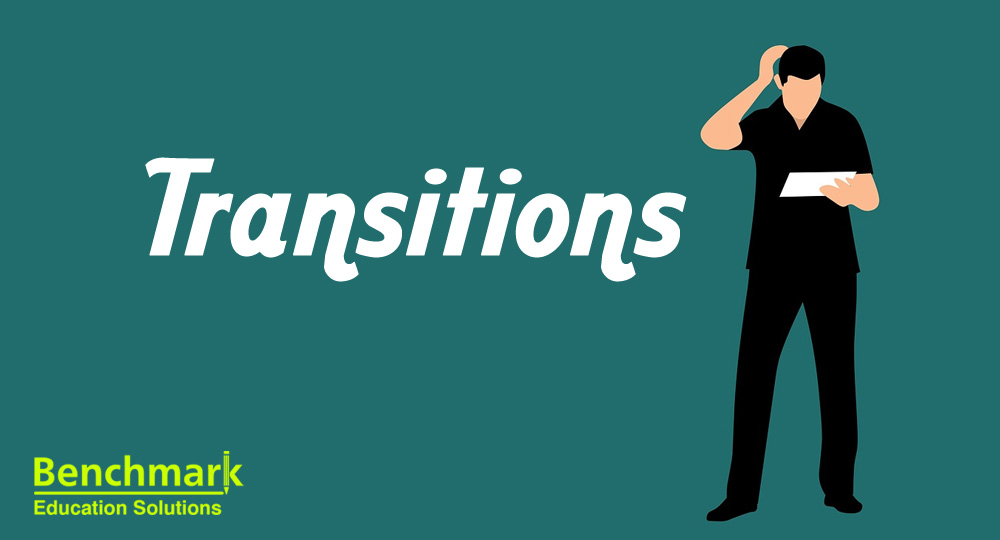How to Build Logical Flow with Transitions in TOEFL


In both written and spoken English, it is important to let your audience know when you are moving from one idea to the next, as well as why you are doing that. This prevents a common problem, which is awkward jumps and gaps in meaning.
Imagine you are watching a movie. The characters are sitting talking about robbing a band, and then suddenly they are in the bank. A moment later, they are driving quickly away. How confusing!
This is what happens when you are writing an essay or talking and you do not use transition words and phrases. Suddenly one of your ideas ends and the next one begins. Your reader or listener is left confused, wondering what happened.
In this article I will talk about transitions and why they are useful for TOEFL candidates. So pay attention if you want to advance your writing skills and get a better score in the test.
What are transitions?
A transition is a word or phrase that joins together two clauses or sentences. These help tell the reader what is happening by saying, “Hey, we’re going to move onto this new idea, and that will be a direct result of this first thing!” Of course, ideally we do not want to say that, and instead we will just use one or two words to do it.
Some of the most common transitional words that we find in English writing are “however” and “therefore.” These are the same part of grammar (conjunctive adverbs) but they have very different meanings. “However” essentially means “despite what I previously said, I’m going to say something that is quite contradictory.” For example:
- Eating at a restaurant every day is really expensive; however, it avoids the waste that comes with buying too many vegetables and having to throw them away.
You can see that we have highlighted the difference between these two ideas. They seem to be in contrast with one another.
“Therefore” shows cause and effect. It is like saying to someone, “Listen…remember that previous thing I just said? Well, because of that, this next thing happened!”
- Governments have frequently given bailouts to big businesses when it has looked like they would collapse. Therefore, people have lost a lot of trust in the relationship between these governments and corporations.
Here, we have shown that the second idea is a direct result of the first.
You might well be wondering about the grammar and punctuation of these words. In the first sentence, I put my transition after a semi-colon but in the second I put it after a period. Technically, these are the same part of speech and can be used in the same way. Both could come after a semi-colon or period. However, we typically use semi-colons where the meaning is very close and obvious, as well as when the two clauses are both quite short. Periods are used otherwise. In fact, if you are unsure of which to use, you should just use a period because it is always acceptable.
Transitions come with a variety of different meanings. We saw above that “however” and “therefore” have completely different meanings, even though they share the same grammatical function. We can group other transitions similarly:
| Function | Examples |
| Demonstrating time | meanwhile, at the same time, then, recently, in the 20th century |
| Giving an example | first of all, for example, for instance, firstly, to illustrate |
| Showing reason | because, as a result, for this reason, due to this, another important factor is |
| Clarifying something | in other words, of course, to put it another way, to summarize |
| Comparing or contrasting | on the other hand, in contrast, similarly, however, nonetheless, on the contrary |
There are many more of these, and you can find long lists of transitional words and phrasing in a dictionary or by searching on Google.
Note that not all of these are exactly the same part of speech and the grammar would be different for using them. However, they all have the same basic function, which is to guide the reader from one idea to another and let them know what is happening with the structure of the essay or paragraph.
Why are transitions important for TOEFL
In your TOEFL exam, you will need to produce both written and spoken English, and these will be examined by an examiner who will mark you on various criteria. They will be looking at whether your ideas follow a logical progression or not, and if you have not used any transitional words or phrases, then you will most likely not succeed in this regard.
Let’s take a sample question from the TOEFL speaking test:
- What is your favorite kind of book to read?
Look at the following three examples and decide which one is better.
- I really like non-fiction books such as Sapiens by Noah Yuval Harari. These kinds of books really interest me because they explore the world around us, as well as our history, in great depth and give fantastic insight. For example, Harari talks about the invention of religions and corporations as ways of uniting humanity from tribes into modern forms of communication and cooperation. It’s this sort of fascinating idea that makes me go back to non-fiction books time and again.
- I really like non-fiction books Sapiens by Noah Yuval Harari is one that I like. These kinds of books really interest me. They explore the world and history in great depth and give fantastic insight. Harari talks about the invention of religions and corporations. These united humanity from tribes into modern forms of communication and cooperation. These fascinating ideas make me go back to non-fiction books time and again.
- First of all, I really like non-fiction books such as Sapiens by Noah Yuval Harari. The reason is that these kinds of books really interest me because they explore the world around us, as well as our history, in great depth and give fantastic insight. For example, Harari talks about the invention of religions and corporations as ways of uniting humanity from tribes into modern forms of communication and cooperation. In conclusion, it’s this sort of fascinating idea that makes me go back to non-fiction books time and again.
I bet that most of you have realized that the answer is not #2. Of course, this answer is too simplistic and contains no transitional words or phrases. The ideas are therefore quite disjointed and it sounds a little childish, even though it basically features the same information as the others.
Answers #1 and #3 are much better, but answer #3 has some problems. Basically, it overuses transitions. Whilst it is very important to use transitions in your speaking and writing, you must not go too far and use them too much. They can actually have the paradoxical effect of reducing the flow within your writing and can make it sound far too formal, particularly when overly formal transitional phrases are used.
For this reason, the best answer is #1.
Conclusion
To sum up, it is really useful to incorporate some transitional words or phrases into your speaking and writing for the TOEFL because these will really help to bring some logical flow to your essay or speech. However, you must use them appropriately because there are so many of them. They tend to have different grammar and meanings, so be careful when you choose the transition you feel is necessary. Finally, you must also be careful not to use too many transitions. This can actually make your writing a bit stilted and increase the formality to a ridiculous extent.
If you are worried about your under- or over-use of transitions, you can try our TOEFL writing correction service and get expert feedback.


I find your website useful